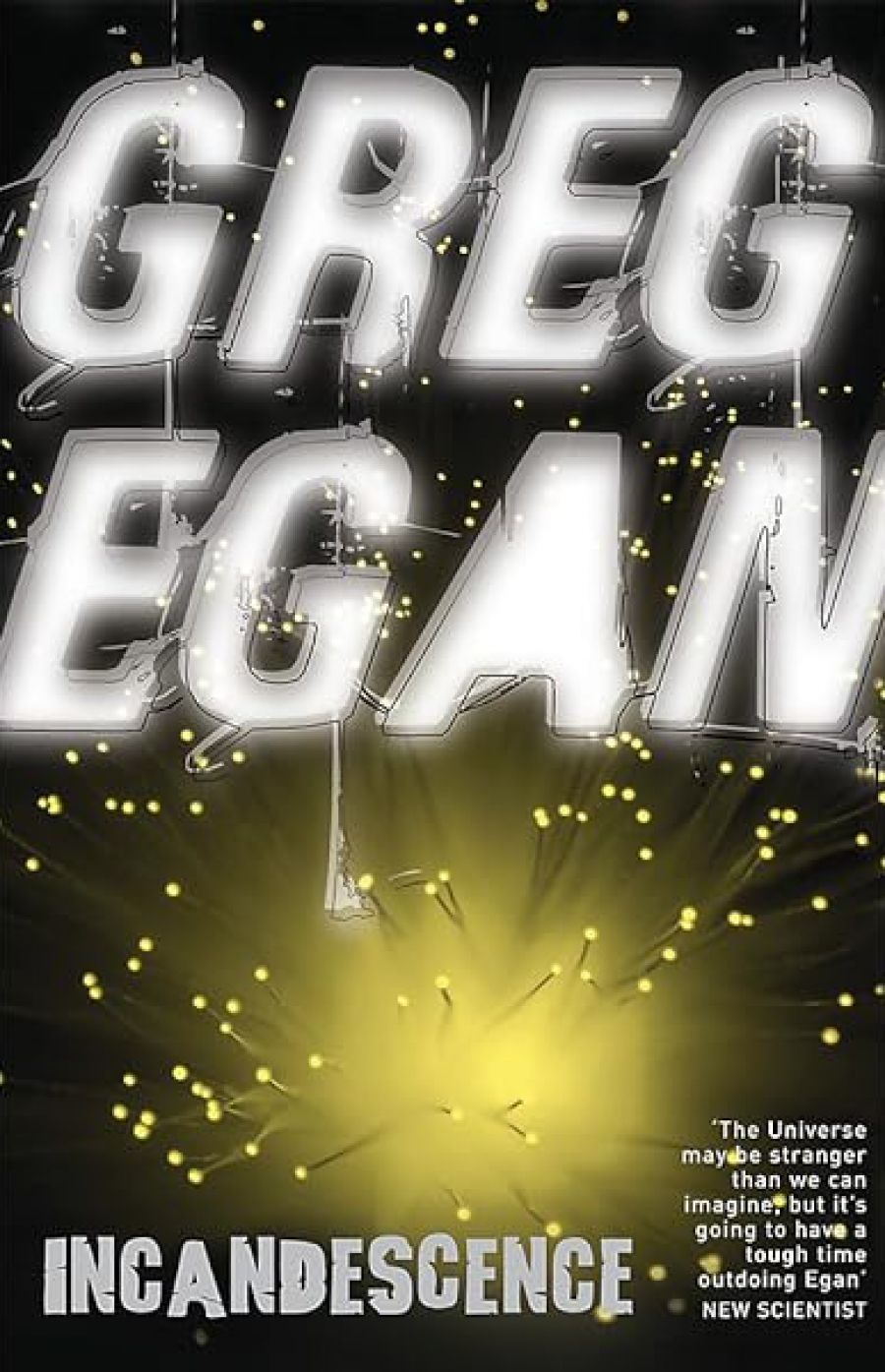
- Free Article: No
- Contents Category: Fiction
- Review Article: Yes
- Article Title: Incandescence and digital people
- Online Only: No
- Custom Highlight Text:
What do you do when you can live for thousands of years, travel nearly everywhere you wish in the galaxy, and customise your environment and your body to be exactly the way you like? When there is no risk of starvation, injury, or disease? When your back-up simply takes over when, for some reason, you die? What do you do if the whole universe is your playground and you’re just plain bored?
- Book 1 Title: Incandescence
- Book 1 Biblio: Gollancz, $35 pb, 300 pp, 9780575081635
- Book 1 Cover Small (400 x 600):

- Book 1 Cover (800 x 1200):

Meanwhile, on a tiny fragment of the once larger world known as the Splinter, Roi has just finished a work shift and is looking for a crevice to sleep in. There is no night or day on the Splinter: it orbits in the perpetual brightness known as the Incandescence. Splinter’s inhabitants live in tunnels bathed in light and caressed by warm winds from the Incandescence.
Like the substance of her world, Roi’s carapace is also translucent. When she meets her team mates, she can see their hearts beating. Roi is far from bored – lassitude is not a problem her society has in the struggle to survive – but on this day a new opportunity presents itself. A meeting with the enigmatic Zak leads her to wonder, for the first time, why and how gravity on the Splinter varies from one edge to the other. While Rakesh is embarking on a journey into the past to seek the source of the DNA, Roi and Zak are led to the startling conclusion that the Splinter is unstable, and the harsh but safe world they know may be about to undergo radical change. How the paths of these very different beings cross is the story of Incandescence
Egan is considered one of the leaders of the recent resurgence in hard science fiction. In this novel he explores themes that are familiar from his previous works (of which the standout examples are Diaspora, 1997, and Schild’s Ladder, 2002); these include the nature of embodiment. Rakesh is descended from DNA life, even though he chooses to live as software most of the time; but his companion in the journey, Parantham, is not. She is a ‘native of scapespace’, without any of the residual instincts of organic flesh. A subtle theme of the book is how Rakesh and Parantham experience the same places and events in different ways, even though they are essentially from the same culture.
Many of Egan’s works utilise concepts from topology, quantum mechanics, and relativity. In Incandescence he aims to explore how a pre-industrial civilisation, such as that on the Splinter, could discover general relativity. The inhabitants of the Splinter have a number of handicaps in this direction: they live inside tunnels, and the Incandescence renders the stars invisible. Their scientific equipment is spare and simple. But with a few basic measurements, and the limited information passed on from their ancestors, Roi, Zak, and their expanding team of scientists are able to construct a theory of relativity that has the potential to save their tiny world from the physical forces that threaten it.
It is a bold attempt, but it does not make for easy reading. Much of the plot revolves around the experiments of the Splinter’s first generation of scientists and the evolving theorems that they test to understand their universe. While Egan has successfully woven such science into previous novels (such as Diaspora) with finesse, in Incandescence it comes across as didactic and clunky. The effort of following the argument detracts from the pleasure of reading it. Egan has commented that ‘anyone who finds relativity boring should realise that they are simply not part of the target audience for this book’.
It is hard to warm to the characters as well. Rakesh’s search for something worth doing seems shallow, and he is overly precious in his ethical concerns about intervening in the Splinter’s society. His concerns are justifiable, of course; you just begin to wish that he would make a decision and get on with it. As with many of Egan’s works, these digital people are cloyingly moral. It would be interesting if just one of them decided that eternal life as a computer programme could be turned to the cause of evil instead of goodness.
The lives of the Splinter’s inhabitants are governed by their bodies: the experience of gravity as they move from the weightless Null Chamber at the centre of the Splinter to the edges where they arc heaviest; rigours of reproduction; the exigencies of maintaining their precarious food supply. Their world is circumscribed and limited. yet from this place they must learn how to understand a universe they have never seen. Rakesh and Parantham, by contrast. can travel as encrypted software from one end of the galaxy to the other, back themselves up, and re-embody themselves to suit each situation.
Their encounter, and the passive involvement of the Aloof, raise many very interesting issues about crosscultural exchange. Ultimately, though, Incandescence is unsatisfying: worth reading, but unlikely to keep you up until the early hours of the morning.


Comments powered by CComment